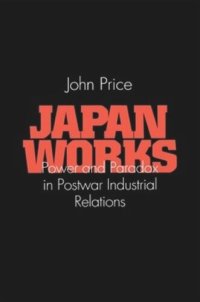
Ebook: Japan Works: Power and Paradox in Postwar Industrial Relations
Author: John Price
- Year: 2018
- Publisher: Cornell University Press
- Language: English
- pdf
The postwar miracle, says John Price, made Japan and its corporations the toast of the global village, with scholars across the United States pointing to Japan as the model for future enterprise. The economic bubble burst, however, in 1989, and Price documents difficulties that have surfaced since that time. In Japan itself, the common self-assessment is "rich country, poor people" and government reports regularly criticize society for being too enterprising. In emulating Japan, Price asks, are we choosing a path Japan itself is rejecting?Price probes the paradoxes in postwar labor-management relations, particularly in the years between 1945 and 1975. Basing his analysis on the history of labor in Mitsui's Miike mine in Kyushu, Suzuki Motors in Hamamatsu, and Moriguchi City Hall, the author questions the common interpretation that industrial relations are based on lifetime jobs, seniority-based wages, and enterprise unions. He also asks whether Japanese workers have been genuinely empowered by the developments in recent years. In his description of the rough-and-tumble world of postwar Japanese industrial relations, Price pays particular attention to the Occupation period, the rise of Shunto, the increased industrial conflict prior to 1975, and the transition to generalized labor-management cooperation. Relying on French regulation theory and on Michael Burawoy's concept of production regimes, Price suggests a revisionist interpretation of the transformation of Japan's political economy, offering new insights into the rise of lean production and the quality movement in Japan.